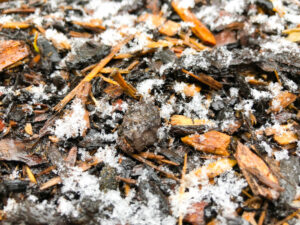It’s winter in Nashville, and tending to gardens and shrubs is probably the last thing on your mind. “That would be a mistake,” say the experts at the Parke Company, Nashville’s leading landscaping service and tree service company. Dry winter winds and the occasional winter warm spell can do real damage to your dormant and evergreen plants.
While Nashville winters are relatively mild, when the temperature drops below 25 degrees and the last of the hardy annuals turn brown and crumble, it’s time to do winter mulching. Why mulch in winter? Unlike spring mulching, which is done to suppress weeds, retain moisture, and warm the soil, the principal reason to mulch in winter is to insulate the soil and prevent damage from dry winter winds.
Insulating the soil to keep it frozen prevents dormant plants from sprouting during brief warm spells in winter. Changes in air temperature can also cause expansion and contraction of soil. Left unchecked, this soil movement can push a plant’s roots above the surface, where they can be damaged by cold winds. Keeping the ground frozen through mulch insulation minimizes the risk of this occurring.

Benefits of Mulching in the Winter
What to Use as Winter Mulch?
Remember last fall when you were raking leaves and doing a major leaf pick up? If you stored those leaves in a leaf bag, now is the time to break them out to be used as winter mulch. You can use any loose insulating material, keeping in mind that you will need to remove it in the spring.
Here are a few ideas for mulch material:
- Pine needles
- Straw
- Shredded leaves
- Shredded bark
- If the first freeze comes after Christmas, you can use boughs from your Christmas tree – great material because they are easy to remove in the spring.
- Snow is actually an excellent insulator, but you can’t count on that in Nashville.
What and How to Mulch in the Winter
We’ve already discussed insulating your flower garden, so let’s talk about other areas to protect.
If you have a fallow vegetable garden and you didn’t plant a cover crop, you can use a layer of leaves. If your vegetable garden is fenced, you can use it to “store” all of your extra leaves. In the spring you’ll have a ready supply of mulch material.
Evergreens and semi-evergreens, like rhododendrons, can become dried out by winter winds. You can protect them by covering the plants/shrubs in burlap. Make sure the burlap is not resting on the shrub or it will freeze to the bush. Stuffing leaves between the burlap and the bush will prevent that.
Another option is to spray the shrub with an anti-desiccant, like Wilt-Pruf. As an aside, an anti-desiccant will prolong the life of your Christmas tree and also makes a good covering for carved pumpkins.
When to Remove Winter Mulch
The short answer is after the thaw, but that can be tricky. Easter snowstorms are not totally unknown in Nashville. Basically, when the smell of mud is in the air, it’s safe to remove the mulch.
If you have questions or need assistance with winter mulching, please don’t hesitate to call us at the Parke Company!
